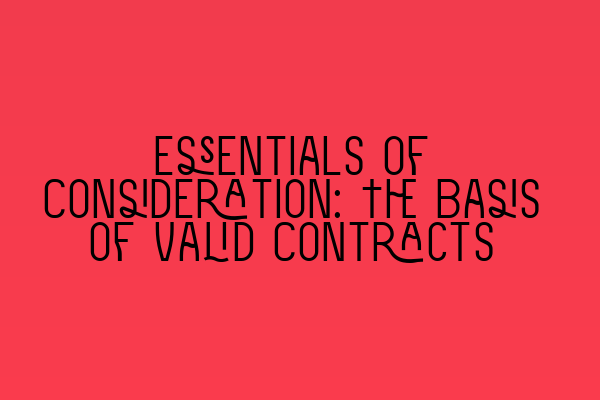Essentials of Consideration: The Basis of Valid Contracts
Welcome to our blog post on the essentials of consideration, a fundamental element in contract law. Whether you are studying for the SQE exams or simply interested in expanding your knowledge of contract law, this article aims to provide you with an in-depth understanding of consideration and its significance in forming valid contracts.
What is Consideration?
Consideration is one of the key elements required to create a legally binding contract. In simple terms, consideration is something of value that is exchanged between parties to a contract. It can be a promise, an act, or a forbearance. Consideration distinguishes a contract from a mere promise and ensures that both parties have provided something of value, thereby forming a mutual obligation.
In contract law, consideration must be sufficient, meaning it must have value, and it must be legally valid. For consideration to be legally valid, it must be something that the law recognizes as sufficient, such as money, goods, services, or even refraining from doing something that a party is entitled to do.
Importance of Consideration
Consideration serves several important functions in contract law:
- Enforcement: Consideration is what makes a contract legally enforceable. It ensures that both parties are bound by their promises and creates a legal obligation to perform the agreed-upon terms.
- Mutuality: Consideration ensures that both parties to the contract have provided something of value. This prevents one-sided, unfair agreements.
- Exchange of Value: Consideration establishes a fair exchange of value. It ensures parties receive something in return for their promises, acts, or forbearances.
- Price Determination: Consideration helps determine the price or value of the contract. It ensures that the parties have agreed upon a fair and reasonable price for the goods or services being exchanged.
Lack of Consideration
In contract law, a lack of consideration can render a contract unenforceable. A contract without consideration is known as a gratuitous promise. Gratuitous promises are generally not binding, as they lack the requisite exchange of value between parties. However, there are exceptions to this rule, such as contracts under seal, where consideration is not necessary.
It is important to note that consideration does not need to be adequate or equal in value. The law only requires that consideration exists, regardless of its relative value. This means that a party can enter into a contract where they receive a nominal consideration, as long as there is some value exchanged.
Conclusion
Understanding the essentials of consideration is crucial in contract law. It forms the basis of valid contracts by ensuring there is a fair exchange of value between parties. Consideration creates enforceable obligations, prevents one-sided agreements, and helps determine the price or value of a contract. It is an essential concept for aspiring solicitors and anyone interested in the field of contract law.
If you found this article helpful, you might also be interested in preparing for the SQE exams. Check out our related articles:
- SQE 1 Practice Exam Questions
- SQE 1 Practice Mocks FLK1 FLK2
- SQE 2 Preparation Courses
- SQE 1 Preparation Courses
- SRA SQE Exam Dates
Stay tuned for more informative articles on contract law and other legal topics!
